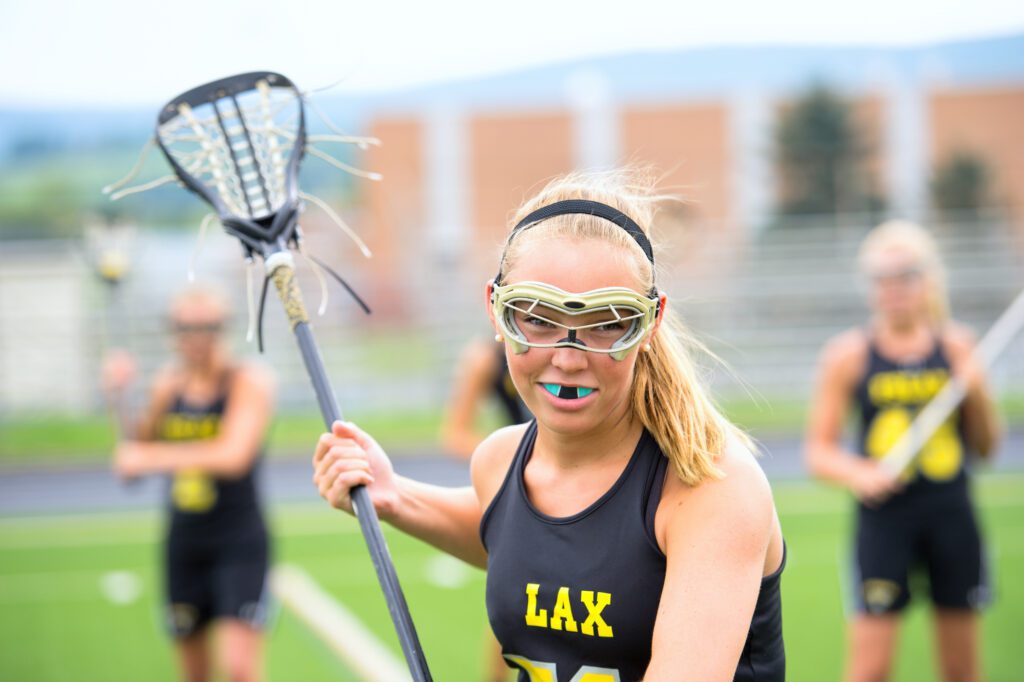Sports dentistry is the prevention and treatment of dental injuries and related oral diseases, as well as the sharing of information and equipment designed to help protect the teeth, mouth, jaw, and face of athletes of all ages. Injuries to the teeth and mouth are common among athletes.
It’s important to protect your child’s smile if he or she plays sports, for aesthetics as well as health reasons. Treating sports injuries are one of the general dentistry services we provide at our Bellmead, TX, dental office.

Common Dental Injuries in Sports
Tooth knocked out:
- Time is the most important factor when trying to save a tooth, so get to your dentist as soon as possible. In general, there is a 30-minute window of opportunity to re-implant the tooth in the socket.
- Do not try to re-implant the tooth yourself.
- The best liquid to transport a tooth in is cold milk. If milk is not available, use saliva (if possible), saline, or if nothing else is available, water.
- Don’t let the tooth dry out or wrap it in anything.
- Don’t touch the tooth root if you can avoid it.
Tooth chipped/cracked:
- Your dentist will likely use an X-ray of the tooth to determine the treatment necessary.
- For a serious chip that exposes the pulp of the tooth, get to your dentist as soon as possible.
- If a tooth is chipped or cracked, sometimes the tooth can be fixed with a filling or bonding alone.
- Sometimes a cracked or chipped tooth affects the tooth’s nerve, and a more complicated treatment may be needed.
Tooth displaced:
- If a tooth is moved due to trauma, see your dentist as soon as possible.
- Do not try to move the tooth back on your own.
- For any mouth discomfort before you get to the dentist, apply ice.
- Preventing Injury
One of the best ways to prevent injury to your child’s teeth and mouth is to have him or her wear a mouthguard while playing sports. There are several mouthguards to choose from, and your doctor can help you choose the best one for your child’s particular needs.
Sports Dentistry FAQs
Just like your arms or ankles, your teeth and mouth can experience injury when you’re playing sports. Learn more.
What are the most common dental injuries in sports?
The most common dental injuries in sports include tooth fractures, complete tooth loss, tooth displacement, and soft tissue injuries to the gums or lips. These injuries often occur due to direct impacts, collisions, or falls. Sports like soccer, basketball, and hockey are high-risk for dental injuries. Protective equipment, such as mouthguards, can reduce the occurrence of these injuries.
Can sports dentistry improve my athletic performance?
Yes, sports dentistry can improve athletic performance by ensuring that your teeth, gums, and jaw are in optimal health. Untreated dental issues, such as tooth pain or jaw misalignment, can cause discomfort and distraction during athletic performance. Additionally, properly fitted mouthguards can prevent injuries that would otherwise sideline an athlete. Healthy teeth and gums contribute to an overall better physical condition, which supports peak performance.
How does sports dentistry help athletes with jaw injuries?
Sports dentistry can help athletes with jaw injuries by assessing the damage and providing treatments such as splints, mouthguards, or corrective dental procedures. In cases of jaw fractures, a sports dentist may work with oral surgeons to provide treatment and rehabilitation. Sports dentists also help manage the recovery process, ensuring that the athlete’s oral health is fully restored and that the injury doesn’t affect their performance.
What is the role of sports dentistry in concussion prevention?
While sports dentists cannot directly prevent concussions, they can reduce the risk of related injuries by fitting athletes with properly designed mouthguards. Studies suggest that well-fitted mouthguards can help absorb shocks to the jaw, potentially reducing the severity of concussions. Sports dentists also collaborate with other medical professionals to monitor any dental or jaw-related symptoms that could be linked to concussion-related trauma.
Are there special mouthguards for athletes with braces?
Yes, there are specialized mouthguards designed for athletes with braces. These mouthguards provide extra cushioning and protection around braces and wires, reducing the risk of cuts or damage to the soft tissues in the mouth. Custom-fitted mouthguards are recommended for optimal protection, as they accommodate the unique shape of the athlete’s mouth and braces. Dentists can create a personalized mouthguard that fits comfortably over the braces.
How often should athletes see a sports dentist?
Athletes should visit us at least once a year for a comprehensive examination, but more frequent visits may be necessary depending on the sport and risk level. During these visits, a sports dentist will assess oral health, check for signs of wear and tear, and ensure that protective gear, like mouthguards, are in good condition. Athletes involved in high-contact sports should be especially vigilant about regular dental check-ups.
